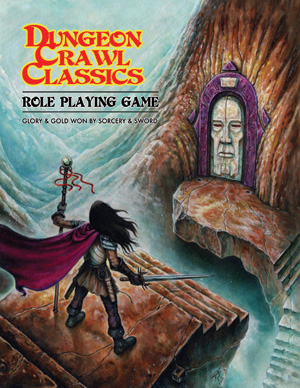 This article is another in the weekly series in which I have been looking at each of the Dungeon Crawl Classics RPG character classes. I have looked at the Warrior, the Thief, the Dwarf, the Cleric, and the Halfling in previous weeks.
This article is another in the weekly series in which I have been looking at each of the Dungeon Crawl Classics RPG character classes. I have looked at the Warrior, the Thief, the Dwarf, the Cleric, and the Halfling in previous weeks.
As we came down to the end of the series I posted a poll to see which classes people wanted to see next. The Halfing just managed to win that poll with the Wizard coming in a close second. This week I will be taking a look at the DCC RPG Wizard.
The Class
Being a Wizard in Dungeon Crawl Classics RPG is dangerous. Wizards draw their power from demons or gods, ancient black magics from long forgotten tomes or through deals with the devils or other unearthly beings. While great power and magic can come from these exchanges, it is not without risk.
The wizard in DCC RPG starts with a d4 hit die at first level. They are able to use a handful of weapons, including long or short swords. While they are able to wear armor it does cause a penalty to spellcasting.
Wizards can choose their alignment with black magic tending to be practiced by chaotic wizards and neutral and lawful wizards practicing more with the elements of the world. Enchantments can be used by any of the three alignments.
Magic is an interesting area in DCC RPG as it includes a large amount of randomness. The randomness factor helps reinforce the idea that magic is not always controllable or predictable. The use of magic is not to be taken lightly. A beginning wizard beings with four spells, these spells are chosen randomly at first level.
When a wizard casts a spell, they must make a spellcheck – a d20 roll plus some modifiers that includes the wizard’s caster level. The result of this roll is looked up on a table for the specific spell being cast. The roll will determine whether the casting was successful, whether the spell is retained for use later, and how great (or little) the effect of the spell is.
As noted above, a wizard can draw their sources of magic from many different places, including supernatural patrons. A wizard can bind themselves to a patron and from that point use a spell called invoke patron to seek special aide in times of critical need. A patron may or may not respond to this request and may or may not barter an exchange to grant the aide requested. While this is quite powerful, it is not without its risks. Most of these risks are left to the liberty of the judge to determine.
A wizard can summon a familiar if they so choose by using a spell to do so. A wizard’s luck modifier applies to rolls of corruption and mercurial magic.
Mercurial magic. This just one way that spells are different and unique depending on the wizard that is casting it. When a new spell is learned by a wizard, they roll on the mercurial effect table to determine how that spell will behave when cast by this specific wizard. There is a table with 100 different effects on the table. These effects can be positive or negative in nature and affect how that spell works each time it is cast.
There are some other mechanics in DCC RPG that affect wizards and the way they cast magic. As mentioned earlier, a wizard makes a spell check roll when they cast a spell to determine if the spell is successful or not. If a wizard rolls poorly they might suffer a misfire, corruption, or patron taint. The table with each spell will help determine the result of the roll and whether a misfire, corruption, patron taint, or possibly all three apply.
Misfires are specific to the spell and tend to include unexpected effects of the spell, frequently detrimental to himself or his allies.
Corruption has a rather significant effect on the wizard. There are three tables for corruption that cover minor, major, and greater. Corruption tends to be things that damage the wizard, leads to an altering of their appearance or other such effects. A wonderful graphic in the book illustrates the progression of a wizard over time. The first frame showing a young, handsome man and by the final image a grotesque hunched over monstrosity.
Finally there is the spellburn mechanic. Spellburn allows a wizard to call upon outside sources such as demons, devils, the darkness between the stars and so on to burn ability score points in a one for one exchange in bonus to a spellcheck roll. A wizard can burn points from their Strength, Agility or Stamina ability scores.
My Impression
The wizard class can seem pretty complex at initial look. With pages and pages of spells with tables and charts, mercurial magic, spellburn, corruption, and misfires. As you start to read more about the class and actually play though you learn that you only need to be concerned with the spells your wizard actually knows and a handful of tables which can easily be brought to the table.
Once over the initial hurdle of familiarizing yourself with the basics of a wizard, I think the mechanics do a very good job of reproducing that “Appendix N” feel for the wizard. Magic is random. Magic is not something to be taken lightly. Magic has its price.
One of my favorite lines from the DCC RPG in the Magic section is “Use a torch, fool; it is much safer!” This line helps set the readers expectation as to how magic works in this world. It isn’t used to light your way in dungeons or to light street lamps or for any trivial task. Magic is not to be trifled with.
In d20 games there is always the debate of Vancian magic systems versus some other magic system and how wizards can over power the rest of the party at higher levels. I think the magic system and wizards in DCC RPG have found an interesting way to balance the wizards power, the frequency they can cast spells with the random nature of making magic dangerous as an elegant solution to the wizard’s power. Sure the wizards can obliterate some foe – but at what possible risk to them or to their party?
I am quite satisfied with how a wizard functions in Dungeon Crawl Classics RPG. It gives me the old-school feel of the wizard from the strength perspective, the power that we all think of when it comes to a wizard with the randomness of something bad happening when casting to temper that power a bit.
Next Week
Next week I will be bringing the character class series to a close with a look at the Elf. The Elf is the last character class on the list! Be sure to check back next Friday for the final article in this series.


Pingback: DCC RPG: The Elf | The Iron Tavern
Pingback: DCC RPG Character Class Series Summary | The Iron Tavern